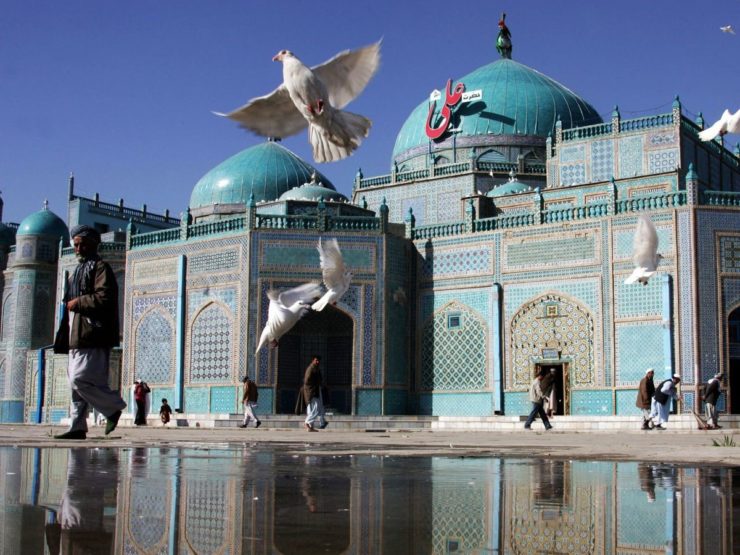
In 2023, Afghanistan experienced a limited return to economic growth and infrastructure development after several years of severing most existing ties. During the year, several significant international events occurred in Central Asia, resulting in increased global attention to the region, and a number of projects of Eurasian scale were initiated. At the end of 2023, it appears that there is a long-term interest from Afghanistan in participating in these projects.
Although the authorities of the country have not yet participated in multilateral meetings, their bilateral contacts with the Central Asian republics have significantly increased. In one way or another, almost all Central Asian republics expressed interest in developing a partnership with Afghanistan in 2023, both in bilateral and multilateral settings.
During the first SPECA summit, President of the Republic of Uzbekistan Shavkat Mirziyoyev invited Afghanistan to participate in the work of this organization, which started positioning itself as a promising interregional association in 2023. A similar call was made by the head of the republic during the Summit of the Economic Cooperation Organization. In 2023, due to ongoing disagreements with individual members, Afghanistan, although a member of these organizations, did not participate.
The creation of the Trans-Afghan Railway is one of the most significant projects in the relations between Uzbekistan and Afghanistan. The railway is designed to connect Central Asia with the Indian Ocean through the territory of Afghanistan. Based on preliminary plans, the main line is projected to span 573 kilometers with a throughput capacity of 20 million tons per year. Construction of the railway line will begin as early as 2024. A delegation from Tashkent traveled to Afghanistan to discuss the project shortly before the 2023 ECO Summit. Several bilateral trade, economic and investment agreements worth more than $1 billion were signed. The multimodal transport corridor “China-Kyrgyzstan-Uzbekistan-Afghanistan” offered in 2022 was another promising project involving Afghanistan promoted by Uzbekistan.
Afghanistan’s role in Uzbekistan’s prospective projects is significant. Even though the construction of the Qosh Tepa Canal in Afghanistan has the potential to worsen the water deficit in Uzbekistan by diverting a portion of the Amu Darya flow to the south, Uzbekistan is not objecting to it.
In 2023, Kazakhstan made a significant move towards cooperating with Afghanistan. On December 29, 2023, it was reported that Kazakhstan removed the Taliban (banned in Russia) from the list of terrorist organizations. This decision expands Kazakhstan’s opportunities for political interaction with Afghanistan. Earlier Kazakhstan proposed a bilateral business forum and expressed interest in increasing exports of agricultural products to the country.
Turkmenistan also pins its hopes on Afghanistan. The recent progress on the third stage of the development of the largest gas field in the republic has increased the importance of promoting the Turkmenistan-Afghanistan-Pakistan-India (TAPI) Gas Pipeline. The project was initiated with a memorandum of cooperation signed with a large company from the UAE on January 6, 2024. Afghanistan is expected to play a key role as the major transit point for Turkmen gas. The visit of the Turkmenistan delegation, led by the Foreign Minister of the republic, to Afghanistan in December 2023 is evidence of the strengthening ties between the two countries. During the meeting and consultations with representatives of railway transport, the parties discussed the prospects for developing the Lapis Lazuli Corridor. This transit route links Europe and Asia via Afghanistan, Turkmenistan, Azerbaijan, Georgia, and Turkey.
However, not all countries in the region share such a positive view of Afghanistan’s “interim government.” In particular, President of Tajikistan Emomali Rahmon expressed his concern about the situation in Afghanistan and on Tajikistan’s border with that state both at the 2023 CSTO and SCO summits and during his official visit to the Russian Federation. However, there is no political tension affecting trade between Afghanistan and Tajikistan. For instance, in early 2023, the two countries extended their deal on the supply of electricity, which has significantly increased in volume over the past year. The high-voltage line known as CASA-1000, which, like the TAPI gas pipeline, will connect the Central Asian republics to Pakistan via Afghanistan, is considered one of Tajikistan’s and Kyrgyzstan’s most promising projects.
The renewed interest in Afghanistan’s economy, transportation, and infrastructure by various stakeholders is in line with the World Bank’s report on the country’s economic assessment. The report also includes a positive assessment of the dynamics of the investment climate. It supports the authorities’ efforts to ensure macroeconomic stability.
Thus, 2023 clearly marked the trend of Afghanistan toward re-entering the international political and economic space of Central Asia. Currently, there are only limited bilateral contacts. However, some states in the region are already actively discussing and even preparing to implement multilateral projects involving this country. Afghanistan’s location is strategically important for all Central Asian countries as it provides the shortest routes from the region to the Indian Ocean. This is particularly valuable for landlocked countries, as it provides access to important sea routes and dynamic markets in Pakistan and India. Economic and transport projects related to Afghanistan are currently more advanced than the political dialogue, which still faces development issues.
Boris Kushkhov, the Department for Korea and Mongolia at the Institute of Oriental Studies of the Russian Academy of Sciences, exclusively for the online magazine “New Eastern Outlook”
